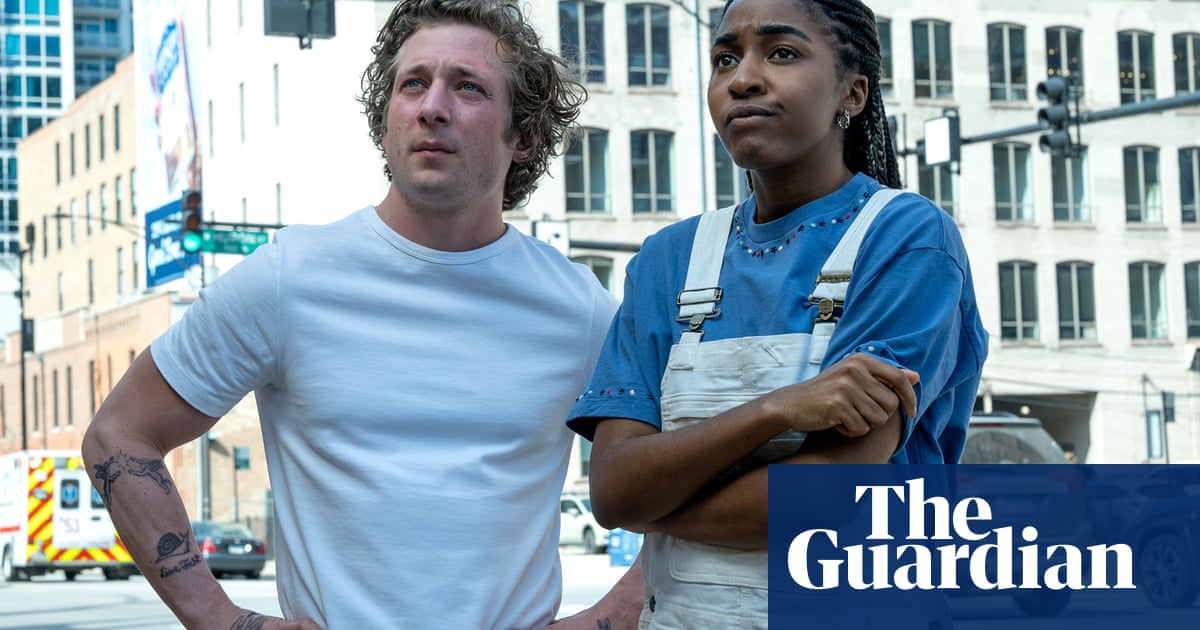
Ayear ago, The Bear, an FX on Hulu series about a beleaguered Chicago sandwich shop with big-league aspirations, became the breakout show of the summer for primarily two reasons. One, it viscerally captured, better than any scripted show in recent memory, the cortisol and cacophony of a working kitchen; each episode barely left the backroom of The Original Beef of Chicagoland, a near-constant stream of oversubscribed orders, combustible egos and “yes chefs”. And two, it was palpably hot, not least because The Beef was almost always one mistake away from a grease fire.
There was the ever-present heat of a deadline, the scorching pressure to keep up and the volatile perfectionism of head chef Carmen “Carmy” Berzatto (Jeremy Allen White). White’s Carmy – tattooed, masochistic, grief-addled yet highly competent in a tight white T-shirt – became an overnight internet boyfriend, a dirtbag sex symbol whose lack of any apparent interest in sex only heightened his appeal. With eight half-hour episodes, no sexual or romantic storylines and an ensemble kitchen crew cast that grew better by the scene, The Bear was one of the very few shows that left me craving more.
Its second season, which premiered in full on Thursday, mostly does away with those hooks, at least at first. It opens in a too-quiet hospital room, where sweet-natured pastry chef Marcus (Lionel Boyce) looks after his terminally ill mother. We follow him to work, but the Beef is closed, in service of season-long (and, of course, financially strained) reinvention as a fine-dining establishment with Michelin aims. (Carmy estimates the renovation costs, somewhat unbelievably, on a pizza box with Sharpie.)
Created by Christopher Storer, an executive producer of Hulu’s Ramy, the second season of The Bear shares the former series’ roving sensibility, each episode taking up residence with a different character, sometimes in a different city, with psychological flourishes. (Ramy’s star and creator, Ramy Youssef, directed the fourth episode, set primarily in Copenhagen.) It’s an ambitious sophomore gambit: shut down the orders, strip away the kitchen, shift focus away from the ever-stressing Carmy. And for the most part, it works.
That’s in large part due to the strength of the ensemble, from lovably unpolished handyman Neil Fak (real-life chef Matty Matheson) to tightly wound “cousin” Richie (Eben Moss-Bachrach), from Ayo Edebiri’s deadpan co-head chef Sydney to many-layered line cook turned sous chef Tina (Liza Colón-Zayas). But it’s also a sense of uplifting camaraderie that courses throughout the second season. There was always a hint of sweetness to The Bear (see: the first season conclusion in which the crew discovered money hidden in tomato cans by late Berzatto brother Mikey, which never really made sense). The sophomore outing elevates it to a predominant flavor. Unlike for much of the first season, the majority of The Bear’s characters root for each other. There’s always a fight over the million and one hurdles to opening a new restaurant, but someone on the team steps up to figure it out. People yell, but also apologize, take ownership, evolve. People warm up to each other; people recognize that others are trying their best. Everyone has an epiphany about the value of acts of service, and develops a sense of purpose through a collective, albeit at times janky and imperiled, endeavor.
In other words, to watch The Bear season two is to watch a new show take up the recently departed Ted Lasso’s mantle as the spiky and expletive-laden feelgood dramedy about a work family – or, at least, the mantle early Ted Lasso set for itself, before it devolved into an overlong and overly sentimental parody of its own “be kind” aspirations. It helps that Carmy is as close to an anti-Ted Lasso as one could get, besides their mutual propensity for panic attacks. White again plays Carmy as openly bruised and curved inward, allergic to leisure and suspicious of pleasure; he begins the third episode at an AA meeting talking about how he Googled the meaning of “fun”. And the line-by-line tone of The Bear is more crude than endearing – this is a workplace that mixes whiteboard aphorisms such as “let’s start from a positive place <3” with “suck my butt – Fak”.
There are elements of the second season that feel too attuned to the demands of internet thirsters – a flicker of a social life for Carmy (how would he behave at a party?) and a love interest in the form of Molly Gordon’s Claire, an emergency medical resident and former high school classmate given little depth beyond helping Carmy’s anxiety and staring at the camera (or, as one Reddit user put it, playing “dead wife in an indie movie”). But it is, overall, a refreshingly bold season of television for a show that consistently believes in some core human goodness, though often sliced and diced by addiction, grief and self-destruction. The season’s chef d’oeuvre is its sixth installment, Fishes, a flashback episode to a cursed Feast of the Seven Fishes a few years prior with a who’s who of guest stars as volatile Berzatto friends and family. It’s an hour of old resentments, new vulnerabilities and raw hurt brought to such a boil that I watched the last 20 minutes through my fingers. Some people change; some patterns repeat.
The final episodes, in which The Bear reopens with chaotic management and polished aspirations, lands somewhere in the middle – not a rousing success yet not a failure, Carmy accidentally locked in a walk-in fridge while his team hangs on without him. It’s a Bear – classic cortisol shot of stress and slapdash teamwork that wraps before the restaurant really begins, a sweet victory tinged with enough bitterness that I’m left, once again, wanting more.
The Bear is available on Hulu in the US and will start again in the UK later this year












